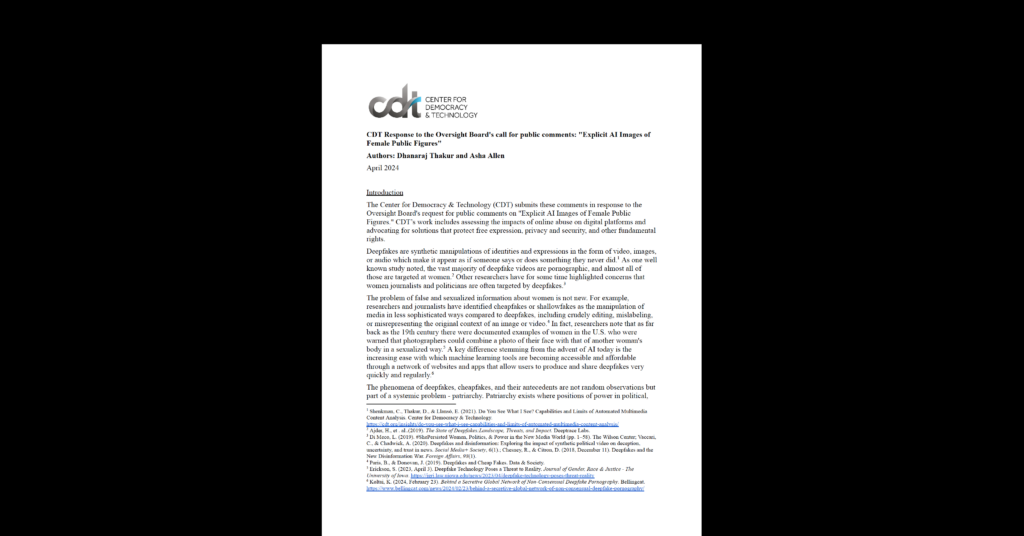French Policy-Making Approach Inconsistent with OECD Principles

At the end of June, the French government caused a stir when details were leaked of a draft executive order that would have given government agencies broad authority to order the removal or blocking of certain content from the Internet. Though the French Minister for the Digital Economy, Patrick Besson, announced later that week that the executive order would be revised (program available here, in French), both the scope of the initial draft and the likely process for revising it raise significant free expression, due process, and transparency concerns.
This proposal is clearly problematic in a number of aspects. The scope of content possibly subject to these orders is broad and ill-defined, leaving room for excessive and unjustified blocking of lawful content. Compounding these censorship concerns is the apparent lack of judicial involvement contemplated in the order-granting process. And it would dramatically expand the number of government agencies involved in regulation of the Internet, apparently aiming to give the French government broad power over online content.
The French government’s process in developing this order is also notably lacking in transparency: The text of the draft executive order has remained confidential, and its existence was only revealed when the recently created National Digital Council published the highly critical consultation on the order that the government had requested. The NDC is an advisory body composed exclusively of private sector representatives and whose mission is to assist the government in developing its Internet policies. Among several issues, the NDC questioned the compatibility of the draft with France’s subsidiarity principle, akin to protections against intermediary liability in the United States, which requires that the author of illegal content be the primary target of law enforcement, as opposed to Internet intermediaries. The NDC correctly argued that the emergency shortcut procedure described above could easily be abused and access providers turned into the government’s main enforcement tool.
We applaud the NDC for highlighting the significant deficiencies in the executive order and are heartened by Minister Besson’s pledge that the draft will be revised. But, while the government’s decision to collaborate with the industry stakeholders that comprise the NDC in revising the executive order is a positive development, the French government’s persistent exclusion of civil society from Internet policy discussions is a cause for concern. In announcing the government’s plan to re-examine the executive order, Minister Besson did not indicate that he would invite civil society organizations to the drafting table. If confirmed, this should hardly come as a surprise: France already excluded civil society from the e-G8 meeting it convened last month, in flagrant disregard for true multi-stakeholder processes.
The importance of developing Internet policy through the active involvement of civil society, members of the Internet industry, and representatives from governments, cannot be overstated. This bedrock principle of Internet governance was proclaimed at the international level as early as 2003 at the UN World Summit for the Information Society, and is affirmed most recently in the principles for Internet policy-making adopted last week in Paris by the Organization for Economic Cooperation and Development. These Internet policy principles focus on the conditions – a combination of multi-stakeholder policy development, very limited government regulatory activity, and limited gatekeeping obligations on intermediaries – that have allowed the Internet to develop into the remarkable platform for expression and innovation that it is today.
Though some have pointed out potential pitfalls, the OECD principles are a promising start for Internet policy-making (see Leslie Harris’s detailed discussion of the principles here). At their core, they espouse the importance of maintaining an open and innovative Internet that serves as a global platform for free expression. As stated in the preamble, the 34 member nations who signed on to the principles “recognized that the Internet allows people to give voice to their democratic aspirations, and any policy-making associated with it must promote openness and be grounded in respect for human rights and the rule of law.”
The principles highlight the importance of fair process and transparency in the policy-making process and in the substance of policies themselves. The principles also recognize the key role that Internet intermediaries, including content hosts and access providers, play in creating and maintaining a vibrant Internet ecosystem that supports free expression, and note that sound Internet policy relies on limiting the liability these intermediaries face for user content. Further, they strongly emphasize the continuing need for multi-stakeholder processes that necessarily include representatives of civil society.
France is a member nation of the OECD and a co-signatory to these Internet policy-making principles. The draft executive order expands the scope of government oversight of Internet content, imposes new content-policing obligations on intermediaries, and was drafted through an opaque process closed to civil society – making it wholly inconsistent with any meaningful interpretation of the OECD principles. Agreeing to the OECD principles represents a commitment to transparent, truly multistakeholder processes that develop policies that seek to maintain an open Internet. To mean anything, that commitment must take orders like this one off the table.


